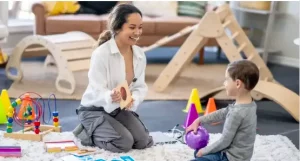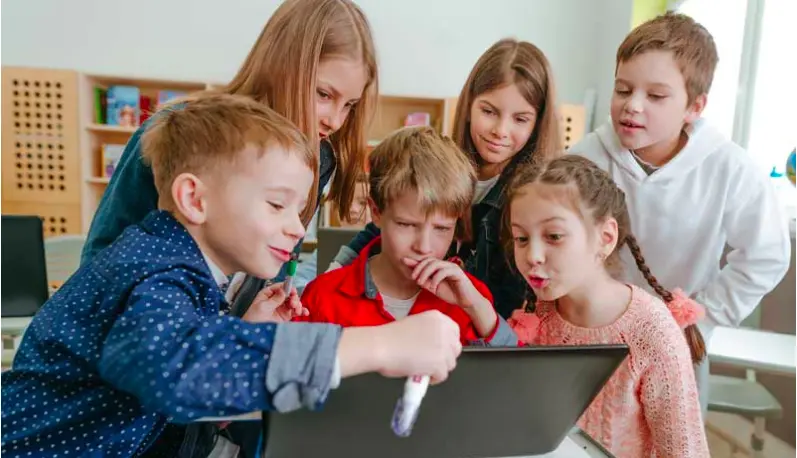Techniques To Improve Kids’ Focus and Concentration
In today’s world of constant stimulation, it’s no surprise that many parents are concerned about their child’s ability to stay focused. Whether it’s daydreaming during homework, struggling to follow instructions, or bouncing between tasks, the question of how to improve concentration in kids is more relevant than ever.
But here’s the good news: attention struggles in children are normal and often manageable. With the right strategies, patience, and understanding, you can help your child build better focus, concentration, and self-regulation skills that will support their learning, behavior, and everyday life.
Parents’ Concerns About Focus and Concentration
“My child just can’t sit still during homework.”
“She zones out halfway through instructions.”
“He starts a task and then gets distracted within minutes.”
Every parent has been there.
These common concerns often lead to feelings of frustration and confusion. But it’s important to understand that focus and concentration are skills, not fixed traits. Just like reading or riding a bike, they develop with time, guidance, and practice.
Setting a supportive tone is essential. Rather than seeing attention difficulties as a problem, let’s view them as a normal part of development, one that we can nurture with the right tools and understanding.
What Is Focus and Concentration in Child Development?

Focus is the ability to direct attention toward a task or activity.
Concentration is the ability to sustain that attention over time.
In child development, these skills are foundational. Whether it’s listening in class, completing a puzzle, or tying their shoes, kids use focus and concentration to learn, interact, and grow.
How Do These Skills Develop?
Attention span grows with age:
- Toddlers (2–3 years): 5–10 minutes
- Preschoolers (3–5 years): 10–15 minutes
- Early school years (6–8 years): 15–20 minutes
- Older children (9–12 years): 25–35 minutes
That means a six-year-old isn’t “bad at focusing” if they get distracted after 20 minutes, it’s developmentally expected!
Still, many parents want to know how to improve focus and concentration in their kids, especially when learning becomes more structured. And that’s where techniques come in.
Why Do Some Kids Struggle With Focus?

There’s no one-size-fits-all answer. Some children naturally have shorter attention spans or are more energetic. Others may struggle due to environmental or neurological reasons.
Here are some common causes:
- Lack of sleep or poor diet
- Too much screen time or digital overstimulation
- Stress, anxiety, or emotional concerns
- Boredom or lack of challenge
- Undiagnosed learning differences like ADHD, dyslexia, or sensory processing issues
It’s important to remember: there’s a wide range of “normal.” If your child is struggling, you are not alone, and support is available.
When to Seek Professional Advice
Consider speaking to a pediatrician or child psychologist if:
- Focus problems persist across settings (home, school, etc.)
- They interfere significantly with learning or behavior
- You suspect underlying conditions like ADHD or anxiety
Knowing how to increase focus and concentration starts with understanding the why behind your child’s behavior.
How Can You Tell If Your Child Needs Help With Focus?
Here are some signs that your child may need support:
- Avoids tasks that require sustained attention (like homework)
- Easily distracted by noise, people, or devices
- Forgets instructions or skips steps
- Frequently switches from one activity to another
- Leaves tasks unfinished
- Shows frustration when trying to focus
Real-Life Examples:
- A 7-year-old who starts writing homework but keeps getting up to sharpen her pencil or grab a snack.
- A 10-year-old who zones out during online classes and misses key points.
- A 5-year-old who can’t sit still during story time.
Recognizing the signs is the first step to discovering how to improve concentration in kids.
How To Improve Concentration In Kids: Proven Techniques

Now let’s explore real, actionable techniques to boost your child’s focus. Whether your child is a preschooler or in upper primary, these strategies are designed to work across ages.
1. Keep Distractions Away
Children thrive in predictable, clutter-free spaces. To improve concentration:
- Set up a special study area with minimal visual distractions
- Turn off the TV or background noise during learning time
- Limit screen time outside of learning hours
Creating an environment that supports calm and clarity is one of the easiest ways to increase focus and concentration.
2. Break Tasks Into Small Steps
A big task can overwhelm a child. Break it into smaller parts:
- Use a checklist or visual schedule
- Set short timers for 10–15 minute work sessions
- Offer small rewards for each completed step
This technique helps reduce frustration and improves the child’s belief in their ability to complete tasks – key to how to improve kids’ concentration.
3. Physical Activity Matters
Movement boosts brain function and relieves restlessness. Include:
- Short breaks with jumping jacks or dancing
- Outdoor playtime or a walk after school
- Fun exercises like yoga or obstacle courses
A moving child is a learning child! Physical activity plays a huge role in how to improve concentration.
4. Practice Being Calm and Mindful
Teach your child to slow down with:
- Simple breathing exercises (inhale for 4, exhale for 4)
- Mindful games like “5 Senses” (name what you see, hear, feel, etc.)
- Progressive muscle relaxation
These calming techniques are effective concentration exercises for kids, especially those who are prone to sensory overload or anxiety.
5. Eat Well and Sleep Enough
You can’t pour from an empty cup. A tired or hungry child will struggle to focus.
- Ensure 9–12 hours of sleep based on age
- Provide protein-rich breakfasts and healthy snacks
- Encourage hydration throughout the day
Nutrition and rest are often overlooked yet central to how to improve focus and concentration in children.
6. Praise and Encourage
Focus improves with confidence. Don’t just praise the result, celebrate the effort!
- “You worked hard to stay focused for 15 minutes!”
- Use stickers, high-fives, or extra story time as rewards
- Make learning feel like a win
This positive reinforcement is essential to build motivation and resilience.
7. Play Focus-Building Games
Who says improving focus has to be boring?Try these concentration activities for kids:
- Memory card games
- “Simon Says”
- Jigsaw puzzles
- Spot the difference
- Matching pairs
- Mazes or dot-to-dot
These concentration exercises for kids make learning fun while strengthening brain pathways for attention.
8. Keep a Routine
Children feel safer and more focused when they know what to expect.
- Have fixed times for meals, homework, and play
- Use visual charts for daily schedules
- Keep bedtime and wake-up time consistent
A steady rhythm to the day naturally improves concentration and reduces meltdowns.
Real-Life Scenarios: What Works For Different Ages?
For Toddlers (2–4 years)
- Keep activities under 10 minutes
- Use music, movement, and repetition
- Praise attention even in small doses
For Preschoolers (4–6 years)
- Focus-building games like sorting or matching
- Timed clean-up games to improve task focus
- Simple breathing games for calm
For Early School Age (6–9 years)
- Break down homework into mini tasks
- Use a timer to stay on track
- Include movement breaks every 20–25 minutes
For Older Kids (10+ years)
- Encourage journaling to reflect on attention
- Use planners or digital tools to organize tasks
- Discuss goals and self-monitoring strategies
There’s no universal formula for how to improve kids’ concentration, but adapting to their developmental stage makes all the difference.
Frequently Asked Questions
Q: What are some daily habits to help improve concentration in kids?
A: Consistent sleep, nutritious meals, screen-time limits, and playtime that includes brain games are key habits.
Q: Can concentration be taught or is it a natural skill?
A: It’s definitely a teachable skill! With the right strategies and support, children can build stronger focus over time.
Q: What foods help with focus?
A: Eggs, nuts, leafy greens, berries, and water-rich fruits help support brain health and attention.
Q: How long should my child be able to concentrate at one stretch?
A: Multiply their age by 2–5 to get an average attention span in minutes. For example, a 6-year-old may focus for 15–30 minutes.
Q: When should I worry about my child’s concentration issues?
A: If challenges are ongoing, affect daily functioning, or cause distress at school or home, consider consulting a specialist.
Conclusion: A Brain-Boosting Solution That Works
While every child is different, the goal is the same: to help them thrive, learn with joy, and grow into focused, confident individuals. Knowing how to improve concentration in kids is a gift that keeps giving, supporting their academic success, emotional health, and self-esteem.
At Tickle Right, we take this mission a step further.
Our brain development programme is designed to enhance life skills such as photographic memory, pattern recognition, creative thinking, empathy, art & music appreciation, and scientific curiosity, all through play-based learning.
And yes, one of the key benefits of our programme is an improvement in focus and concentration.
Using a blend of right-brain techniques, multisensory games, and interactive storytelling, we make learning not just effective, but magical.
Because when a child learns how to focus, they don’t just perform better -they discover the joy of learning itself.



